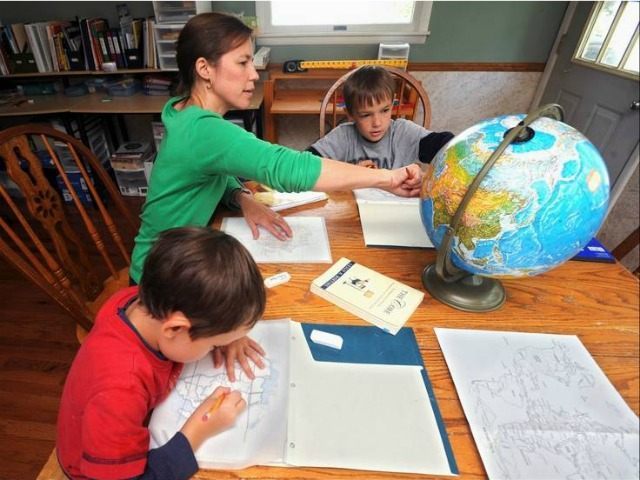The editorial board of the Connecticut Law Tribune is recommending state lawmakers consider the regulation of homeschooling in order to evaluate the potential for child abuse by parents and assure the level of instruction is “equivalent” to what is offered in public schools.
A June 2 editorial states:
Home schooling as a method of instruction is as good or as bad as the parents who employ it. When compassionate and caring parents home-school in an effort to improve the lives and educational outlooks of their children, it can operate in the best interests of the child. But when unscrupulous parents home-school in an effort to hide abuse, the opposite is true. In its current, largely unregulated state, home schooling can enable child abuse by allowing abusive parents to isolate their children from outside contact, thus impeding their ability to seek help, tell others of their abuse or be seen by people who could help them. Home-schooled children would benefit both from improvement in social services and from basic oversight of home schooling.
The board goes on to complain about the “dearth of requirements surrounding home schooling.”
“There are not even minimal qualifications regarding the education or background credentials of the parents as educators—nor is there any curriculum oversight,” it protests.
The editorial board concludes that “checks and balances must be in place to protect home-schooled children and to ensure their well-being.” It recommends lawmakers “make efforts to bring home-schooled children into contact with people who are mandated reporters.”
Deborah Stevenson, an education attorney and executive director of National Home Education Legal Defense, however, asserts the board’s editorial shows it is “uninformed” about the history, law, and practice of homeschooling.
“The argument contained in the article is nothing new,” Stevenson writes at CT Homeschool Network. “Uninformed individuals articulated similar arguments when home schooling came back in vogue in the late 1980’s. It was debunked then, as it can be debunked now.”
Stevenson observes that, from the time of Ludlow’s Code of 1650 in the colonies, parents have had a statutory right and duty “to instruct their own children, or cause them to be instructed.”
“That mandate is codified today in Connecticut General Statute §10-184,” she notes. “In effect, Conn. Gen. Stat. §10-184 places an obligation on parents to instruct their own child in certain subjects, but if they do not wish to do so, parents become obligated to send their child to a public or a private school.”
Stevenson asserts the editorial board provides no reason for its recommendations of changes to state law. It offers neither documentation nor examples of what it claims are “abusive or neglectful parents who are hiding their mistreatment of their children because they home school.”
Additionally, she cites the spread of misinformation when the editorial board states homeschooled children “are not visible on a daily basis to the scores of people who see schoolchildren every weekday,” a statement, she says, that mistakenly assumes only school personnel are mandated reporters of child abuse.
“School employees’ are identified in the statute as only 1 of the 38 types of mandatory reporters,” she points out and lists all 38 categories, including sports coaches, dentists, pediatricians, nurses, police officers, and members of the clergy.
Stevenson then emphasizes what, perhaps, is most obvious:
It certainly is well understood by those in the home schooling community, that, indeed, there are a certain number of parents who neglect and abuse their children, but these neglectful and abusive parents may be found, not only in the home schooling community, but also, and more frequently, in the public school system, as well as in the private school system. Those families are reported to DCF for further investigation. Neglect is not dependent on the type of education a child is receiving. In fact, it is well understood that neglect and abuse can be found anywhere, whether or not a child is being educated in a public school, a private school, or a home school; whether or not checks and balances are in place; and whether or not regulations against it exist. This is just a fact of life, a very unfortunate and sad fact of life.
Regarding the editorial board’s question of “equivalent instruction,” Stevenson agrees no definition exists in the state’s statutes, but then goes one step further to observe that the quality of education varies from public school to public school, depending on the community:
[T]o what, exactly, are the parents showing that their education is equivalent? Are they to show that the education they are providing their children is equivalent to the education being provided to the children in the poorest of the inner cities, or, are they to show that the education they are providing their children is equivalent to the education being provided to children in the richest of communities? Are they to show that the education being provided is equivalent to the education being provided by the worst teacher in a particular school, or to the education being provided by the best teacher in that school?
Nevertheless, Stevenson asserts that even if a definition of “equivalent instruction” is decided upon, the state cannot compel parents to provide it.
“Indeed, repeatedly, the U.S. Supreme Court has held that it is beyond doubt that parents, not the government, have the primary role in the upbringing of their children,” she observes, adding the editorial board’s recommendation of regulation of homeschooling based on the argument of “equivalent instruction” in public schools would be both “misguided” and “an unconstitutional interference with primary role of the parents in the upbringing of their children.”

COMMENTS
Please let us know if you're having issues with commenting.